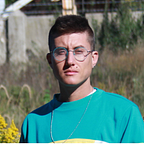A Brief on Hideous Things About David Foster Wallace
Junot Díaz’s accusers are being heard. But the literary world has far worse skeletons in its closet.
8 min readMay 6, 2018
TW: Sexual assault, domestic violence, abuse
On May 4th, Junot Díaz began being publicly accused of assaulting and harassing women at literary events and in his private relationships. This article on Book Riot covers the basics, but there are many more women sharing about their encounters with Díaz under the #JunotDiaz tag on Twitter.
